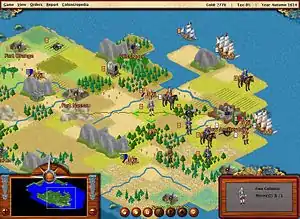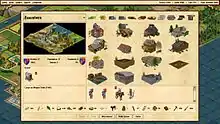FreeCol
FreeCol is a 4X video game, a clone of Sid Meier's Colonization. FreeCol is free and open source software released under the GNU General Public License v2.
 Challenge the New World... | |
 Screenshot from FreeCol 0.5.2 | |
| Original author(s) | The Freecol Team |
|---|---|
| Developer(s) | SourceForge project FreeCol |
| Initial release | January 2, 2003 |
| Stable release | 0.11.6
/ October 17, 2015 |
| Repository | |
| Written in | Java |
| Platform | Java platform 1.8 or later, display 1024×768 or more |
| Available in | 54 languages (translatewiki.net) |
List of languages af ang ar arz be bg br bs ca cs-CZ da de el en-GB eo es et eu fa fi fr gl grc he hsb hu ia id it-IT ja km ko lt mk ms nb nds nl nl-BE nn oc pl-PL pms pt-BR pt-PT qqq ru sq sv ta tl tr uk zh-CN | |
| Type | Turn-based strategy video game |
| License | GPLv2 |
| Website | www |
FreeCol is mostly programmed in Java and should thus be platform-independent. In practice, it is known to run on Linux and Windows, as well as Mac OS X (with some limitations).
While remaining faithful to the original in terms of mechanics and gameplay, FreeCol sports a new set of redesigned graphics. Moreover, in addition to the classical Colonization rules, it features an additional ruleset that incorporates ideas that didn't make it to the final version of Meier's game, requests by fans and original concepts like new European players with new national bonuses.
Gameplay

In FreeCol the player leads the colony of a European power from the arrival on the shore of the New World into the future, achieving victory by one of two possible victory conditions: either gaining independence by declaring independence and subsequently defeating the dispatched royal expeditionary force or by defeating the colonies of all the competing European powers by the year 1600. To be allowed to declare independence, at least 50% of the player's colonists must support independence. This is achieved by producing liberty bells; 200 liberty bells turn one colonist from being a royalist into being a rebel. To be able to defeat the royal expeditionary force the player must train and build a strong enough army of their own.
Another important factor are the numerous settlements of different Native American nations. Native settlements can be traded with to gain gold or they can be conquered for treasure. Native settlements can also teach the player's colonists and turn them into specialist. Specialists are considerably more productive when assigned in their trade. Most specialists can be trained for gold in Europe or come as settlers for free, but certain specialists can only be trained at certain native settlements.
FreeCol starts in 1492 with two colonists on a caravel on the ocean at the player's disposal. The player is the king's proxy and is supposed to lead the caravel to the shore and found a colony in the New World consisting of multiple settlements. The player gets additional colonists by producing food (200 food units in a settlement generates a new unit), by immigration from Europe, by converting the natives or by capturing unarmed units of competing European colonies.
The player may trade with Europe using various natural resources which are produced in settlements or acquired from trade with natives. In each settlement the player can also build up industrial buildings to convert raw materials into processed goods, which sell for more in Europe, providing a significant economic advance.
Nations
Europe
These are the nations available to the player. Each has a unique bonus and some variation of the starting units.
| Nation | Bonus |
|---|---|
| England | Immigration |
| France | Cooperation |
| Spain | Conquest |
| Netherlands | Trade |
| Portugal | Naval |
| Denmark | Agriculture |
| Sweden | Building |
| Russia | Fur Trapping |
Native
Currently there are also 8 native nations; these can't be played. Each native nation has cities and units and the player has the opportunity to train one unit in each of these cities.
Founding fathers
The founding fathers are characters that each give a specific bonus. They are divided into 5 types - Trade, Exploration, Military, Political and Religious - and can be acquired one at a time.
Buildings
When founded, each colony has a set of basic buildings that are tier 1 and can produce goods and other buildings; these buildings can be upgraded up to tier 3. Several other buildings can be built later and upgraded, allowing the player to produce other units and increase his production of goods.
Economy
Resources
Resources are acquired primarily by using a colonist to exploit one of the tiles adjacent to the colony and can be sold or used to produce other goods which can then be sold for a higher profit. The player has the option of trading with Europe or with the native cities; although the natives only accept and have a small number of goods, they have better prices.
Taxes
As the game progresses, the monarch increases the tax the player must pay when selling goods in Europe. The player may refuse the increase in taxes, but will receive penalties from the crown.
Reception
In February 2007 FreeCol was SourceForge's Project of the Month.[1] In 2008 Rock, Paper, Shotgun's game journalist Alec Meer had mixed feelings about FreeCol but still called it: "it's an (sic) remarkable accomplishment, and I'm very glad it's out there." and "FreeCol, though, is here right now, it's free, it's stable, it's pretty much feature-complete and unlike its parent it has multiplayer".[2] In 2010 Alec Meer named FreeCol in Rock, Paper, Shotgun as a better alternative when he was confronted with the later commercial remake Civilization IV: Colonization.[3]
FreeCol became a popular freeware title, which was for instance downloaded over 1,900,000 times on SourceForge alone, between January 2002 and April 2017.[4]
See also
- List of open source games
References
- SourceForge.net: Project of the Month
- Get Ur FreeCol by Alec Meer on Rock, Paper, Shotgun (June 12, 2008)
- A Brief History Of Modern Retro by Alec Meer on Rock, Paper, Shotgun "You may be better off with the open source fan remake, FreeCol." (March 01, 2010)
- dates=2000-04-16+to+2017-04-22 download stats on Sourceforge.net
External links
| Wikimedia Commons has media related to FreeCol. |
- Official website
- FreeCol on translatewiki.net
- FreeCol on the Civilization Wikia
- FreeCol at Open Hub